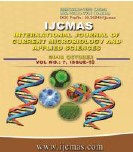


 National Academy of Agricultural Sciences (NAAS)
National Academy of Agricultural Sciences (NAAS)

|
PRINT ISSN : 2319-7692
Online ISSN : 2319-7706 Issues : 12 per year Publisher : Excellent Publishers Email : editorijcmas@gmail.com / submit@ijcmas.com Editor-in-chief: Dr.M.Prakash Index Copernicus ICV 2018: 95.39 NAAS RATING 2020: 5.38 |
A wheat growth model that includes the direct responses of canopy photosynthesis and transpiration to elevated CO2, and the response of crop growth to water stress has been developed and tested. Sensitivity analyses show that different cultivars have quite different responses to changes in ambient air temperature, ambient CO2 concentration and rainfall. Because crops reach maturity earlier under higher temperature, an increase of 3 oC may not impose further water stress to growth of a wheat crop. Climate change, which is simple terms refers to the rise in mean minimum and maximum temperature, elevation in CO2 and other green house gases, coupled with less/more or elastic rainfall patterns is a matter of greater concern for the agrarian ecologies. Climate change is predicted to bring about increased temperature across the world in the range 1.6 ºC to 6 ºC by 2050. And, although rainfall is predicted to increase globally, some areas will receive less annual or uncertain rainfall while others may records significant increase, with associated change in the timing of rains and lengths of dry seasons. There is key factors for significantly impact to mitigate stress conditions of the climate, i.e. Conservation agriculture, zero tillage, Raised bed planting technology, Direct seeded rice, Crop diversification, Leaf colour chart in Rice and Wheat, Integrated Nutrient Management, Weed Management and Water management etc.
 |
 |
 |
 |
 |